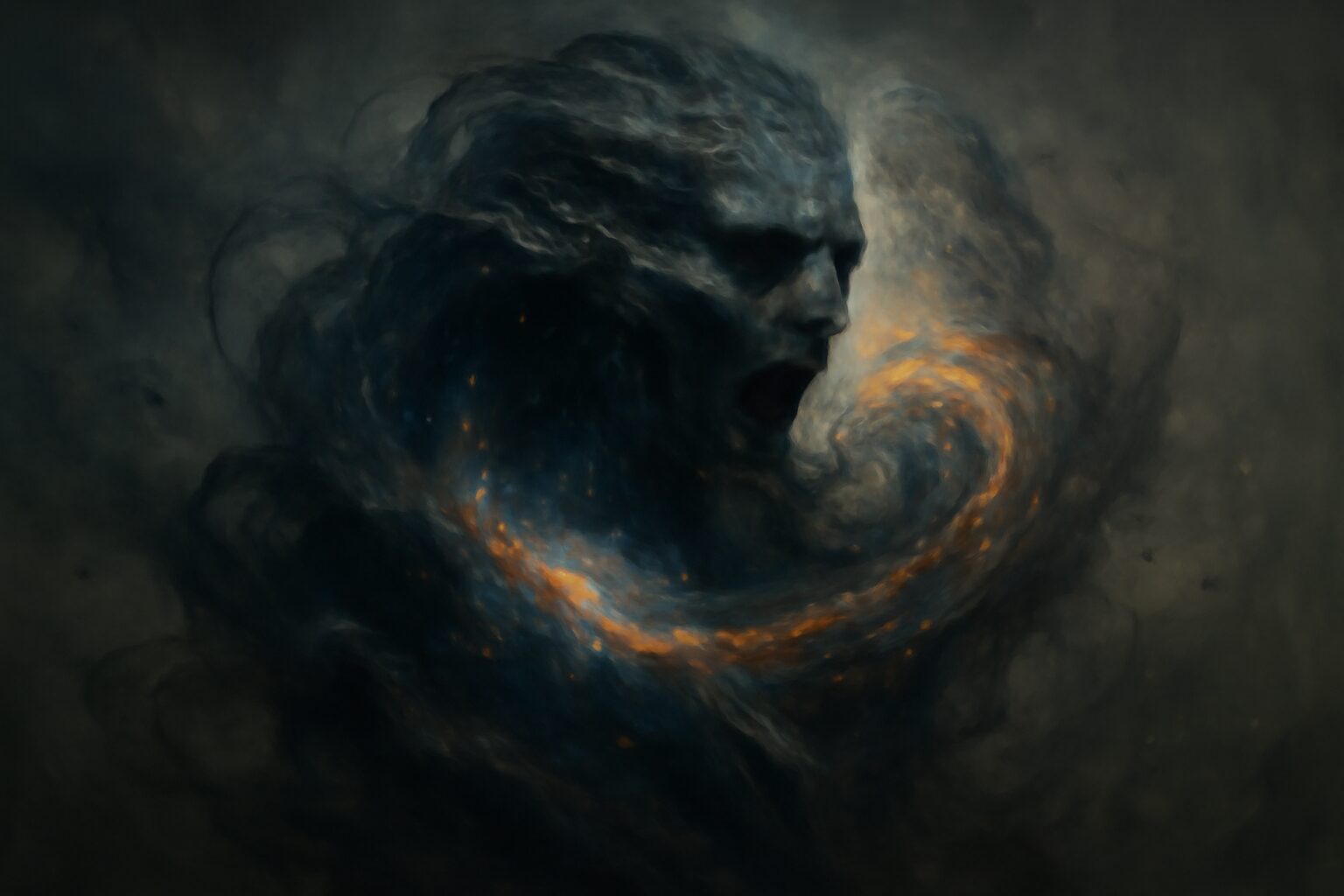Chaos: The Primordial Void of Greek Mythology
In Greek mythology, Chaos represents the formless, primordial void from which all existence emerged. Unlike later gods with human-like forms and personalities, Chaos was a fundamental, abstract force—the very first entity to appear at the beginning of creation. The name itself means "gap" or "chasm," symbolizing the infinite, shapeless expanse that predated the cosmos.
The Origin of Everything
According to Hesiod's Theogony, Chaos was the first being to exist, even before Gaia (Earth), Tartarus (the Underworld), and Eros (Love). From this void, the earliest deities spontaneously arose, including Nyx (Night), Erebus (Darkness), and later, the Titans and Olympians. Chaos was not a creator in the traditional sense but rather the raw, undifferentiated state from which order gradually formed.
Powers and Symbolism
Chaos had no human-like will or consciousness but embodied the concept of infinite potential. It was both a literal and metaphorical space—a realm of nothingness that paradoxically contained the seeds of everything. Later interpretations linked Chaos to air or mist, representing the unseen forces that shaped reality. Unlike later gods, Chaos was rarely worshiped but remained a crucial philosophical concept in Greek thought.
Relationships and Legacy
Though Chaos did not interact with other gods in traditional myths, its descendants played pivotal roles. Nyx and Erebus, born from Chaos, became parents of key primordial beings like Hypnos (Sleep) and Thanatos (Death). The idea of Chaos also influenced later philosophies, symbolizing the unpredictable, uncontrollable forces of nature—a theme echoed in modern terms like "chaos theory."
While overshadowed by the dramatic tales of Zeus and other Olympians, Chaos remains one of Greek mythology's most profound figures—a reminder that even the greatest order begins with the unknown.
Alternative Names for Chaos
God Name: Khaos (Roman)
In Roman mythology, Chaos is sometimes referred to as Khaos, maintaining the original Greek spelling but adapting it to Latin phonetics. This name is used in some Roman texts to describe the primordial void.
God Name: Khaos (Greek (alternative spelling))
An alternative spelling of Chaos in Greek, often used in ancient texts to denote the same primordial deity representing the formless void before creation.
God Name: Caligo (Roman (poetic))
In some Roman poetic traditions, Chaos is referred to as Caligo, meaning 'mist' or 'darkness,' symbolizing the obscure and formless nature of the primordial state before creation.
God Name: Phanes (Greek (Orphic tradition))
In the Orphic tradition, Phanes is sometimes equated with or emerges from Chaos. Phanes represents the first god of creation, light, and order, born from the primordial Chaos.
Tales about Chaos
The Primordial Embrace: Chaos and Gaia
In the beginning, there was only Chaos, the yawning void from which all existence would spring. From its swirling, formless depths emerged Gaia, the Earth, solid and nurturing. Chaos, though the progenitor, watched as Gaia brought forth life and structure, a stark contrast to its own nature of infinite potential and disorder. It was from this interplay that the cosmos began to take shape—order born from chaos, stability from the abyss.
A Balance of Creation
As Gaia flourished, she gave birth to the sky, the seas, and the mountains, each a step further from Chaos’s primordial essence. Yet, Chaos remained the underlying fabric, the silent witness to creation’s unfolding drama. Their relationship was not one of conflict, but of necessary contrast: without Chaos, there could be no definition to Gaia’s form; without Gaia, Chaos would remain unmanifested potential. Together, they embodied the eternal dance of possibility and reality. From this primordial union would eventually spring forth other deities like Tyche, the embodiment of fortune and chance, Caerus, the personification of opportunity, and Hedone, the spirit of pleasure, each reflecting different aspects of the chaotic potential that underpinned creation.
Shadows and Light: Chaos and Nyx
From the depths of Chaos also came Nyx, the primordial night, a deity of immense power and mystery. While Chaos represented the formless void, Nyx brought the first semblance of substance—a blanket of darkness that would cover the nascent world. She was both child and counterpart to Chaos, embodying the quiet, enveloping aspect of the primordial state.
The Birth of Mysteries
Nyx, born of Chaos, went on to mother many children, including Sleep, Death, and Dreams—each a reflection of the enigmatic nature of her origin. Chaos, in its infinite ambiguity, provided the canvas upon which Nyx painted the mysteries of existence. Their connection highlights how even the most abstract beginnings give rise to the tangible and intangible forces that govern life, death, and everything in between. From Nyx's lineage would emerge powerful deities like Keres, the spirits of violent death, Momus, the personification of blame and mockery, and Mania, the spirit of madness, each carrying forward the dark and unpredictable nature of their primordial ancestors.
Frequently Asked Questions
Who is Chaos in Greek mythology?
Chaos is the primordial void or the first entity to exist in Greek mythology. It represents the formless, empty state before the creation of the universe and the birth of the gods.
Why is Chaos important in Greek mythology?
Chaos is important because it is the origin of everything. From Chaos emerged other primordial deities like Gaia (Earth), Tartarus (the Underworld), and Eros (Love), who then shaped the cosmos.
What can we learn from the myth of Chaos?
The myth of Chaos teaches us about ancient Greek beliefs on creation and the universe. It reflects their understanding of how order (cosmos) emerged from disorder (chaos), a concept that still influences philosophy and science today.
Are there any modern references to Chaos from Greek mythology?
Yes, the concept of Chaos is still referenced today in science (e.g., chaos theory), literature, and pop culture to describe unpredictability or the primordial state of existence.
Did Chaos have a physical form in Greek myths?
No, Chaos was not depicted with a physical form like later gods. It was more of an abstract conceptu2014a shapeless, endless void that existed before the physical world.













